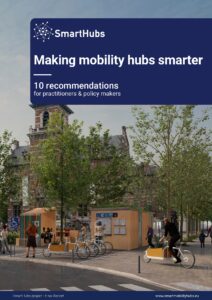Join JPI UE
Faq
FAQ
Please click here for the frequently asked questions we collected.
If you have an additional questions you are welcome to mail us at info@jpi-urbaneurope.eu
Can mobility hubs act as game changer towards the developent of inclusive and sustainable urban mobility and accessibility in European cities? How can mobility hubs be created together with end-users, governments and businesses? The JPI Urban Europe funded project SmartHubs has dedicated itself to answer these questions.
The research was conducted in living labs in Brussels In Belgium, Munich in Germany, Rotterdam and The Hague in the Netherlands, and Vienna in Austria. This final report summarizes the three years of work into 10 policy recommendations. These recommendations touch upon the digital, physical and democratic dimension of mobility hubs, and are relevant not only for public authorities, but also for public transport operators and mobility providers.

1. Mobility hubs need to become smarter to be a game changer for urban transport
2. Integrating mobility hubs into the local Sustainable Urban Mobility Plan facilitates the development of inclusive, democratic and effective solutions
3. Selection of the appropriate location for mobility hubs is crucial for promoting physical integration: The location and services offered by mobility hubs must be based on their specific purpose and goals
4. Identify positive and negative effects for different mobility hub users and local residents
5. Inclusive mobility hubs consider the specific needs of vulnerable to exclusion groups
6. A good participation process has a clear goal, is transparentand allows active debate: Organisers of participation processes communicate the context, structure and scope of the process and actively include different groups of people
7. Use participatory assessment methods to increase the quality of decision-making processes: A participatory assessment process involves different stakeholders and collects their preferences in a structured and transparent manner
8. Co-creation enables the design of inclusive, context-sensitive mobility hubs: Co-design processes and tools facilitate making decisions that meet the needs of all stakeholders, including vulnerable people
9. Provide training and assistance for citizens with limited digital mobility skills. Initiate training sessions and assistance for citizens with limited digital skills to increase their access to app-based mobility services and reduce the digital gap
10. User-friendly interfaces contribute to inclusivity & usage of mobility hubs: Digital interfaces need to be simple and intuitive to be useable by everyone
Accessibility Tool The tool presents results in the form of a map showing the areas accessible from the given locations and a summary table of the amenities that can be reached from each point. Users also have the opportunity to
download the geospatial data and process it further.
Co-design Tool The tool includes a set of gaming materials and a guiding handbook to enable living labs to design tailored Design Games.
Resilience Tool The too is designed to investigate the impact of mobility hubs on urban transport resilience
Appraisal Tool The tool visualises the relevance of each option of a mobility hub for the stakeholders involved
in the process, on the basis of stated criteria as well as their importance. The tool can also show the positive and the negative impacts of the different options.